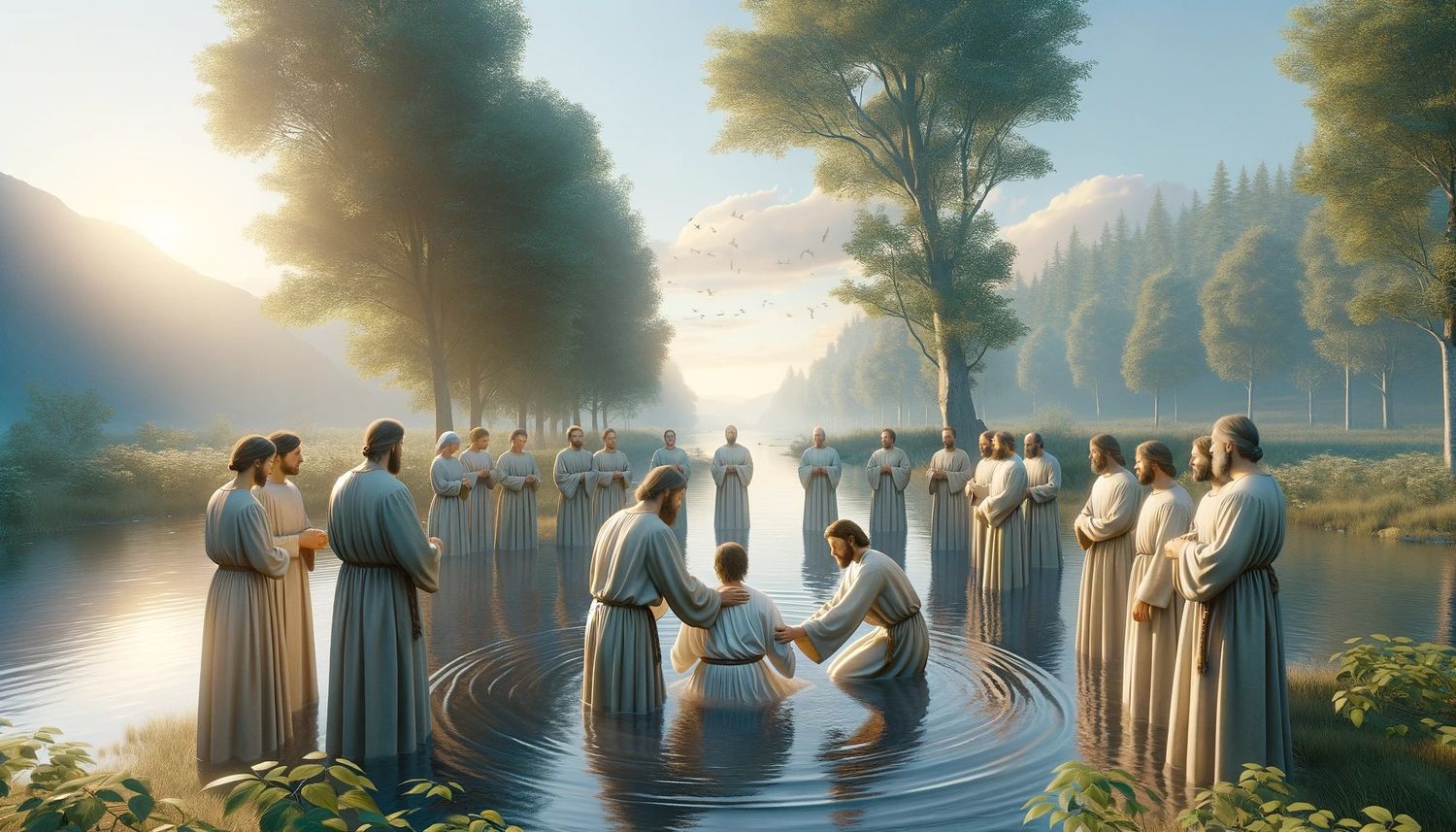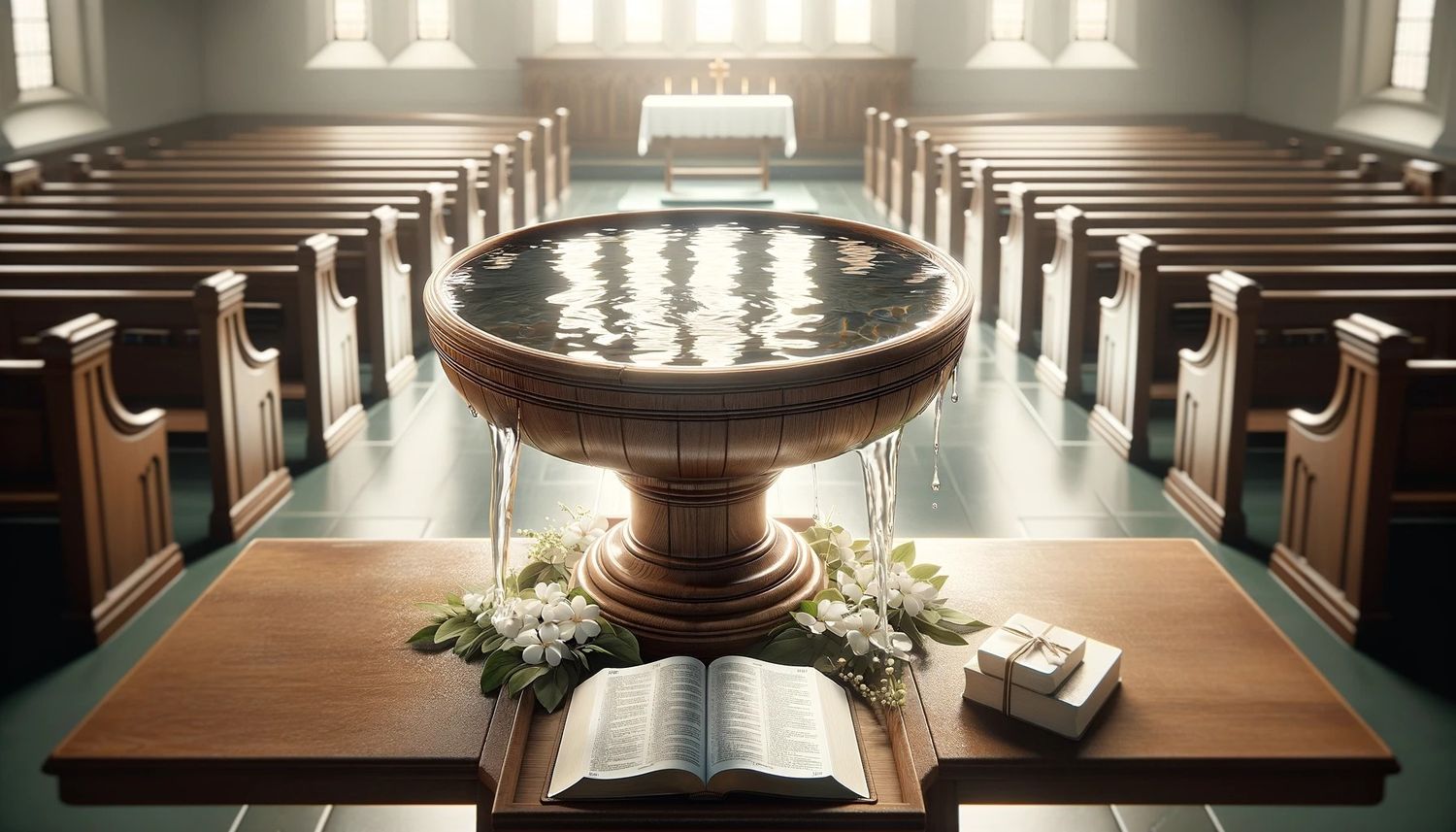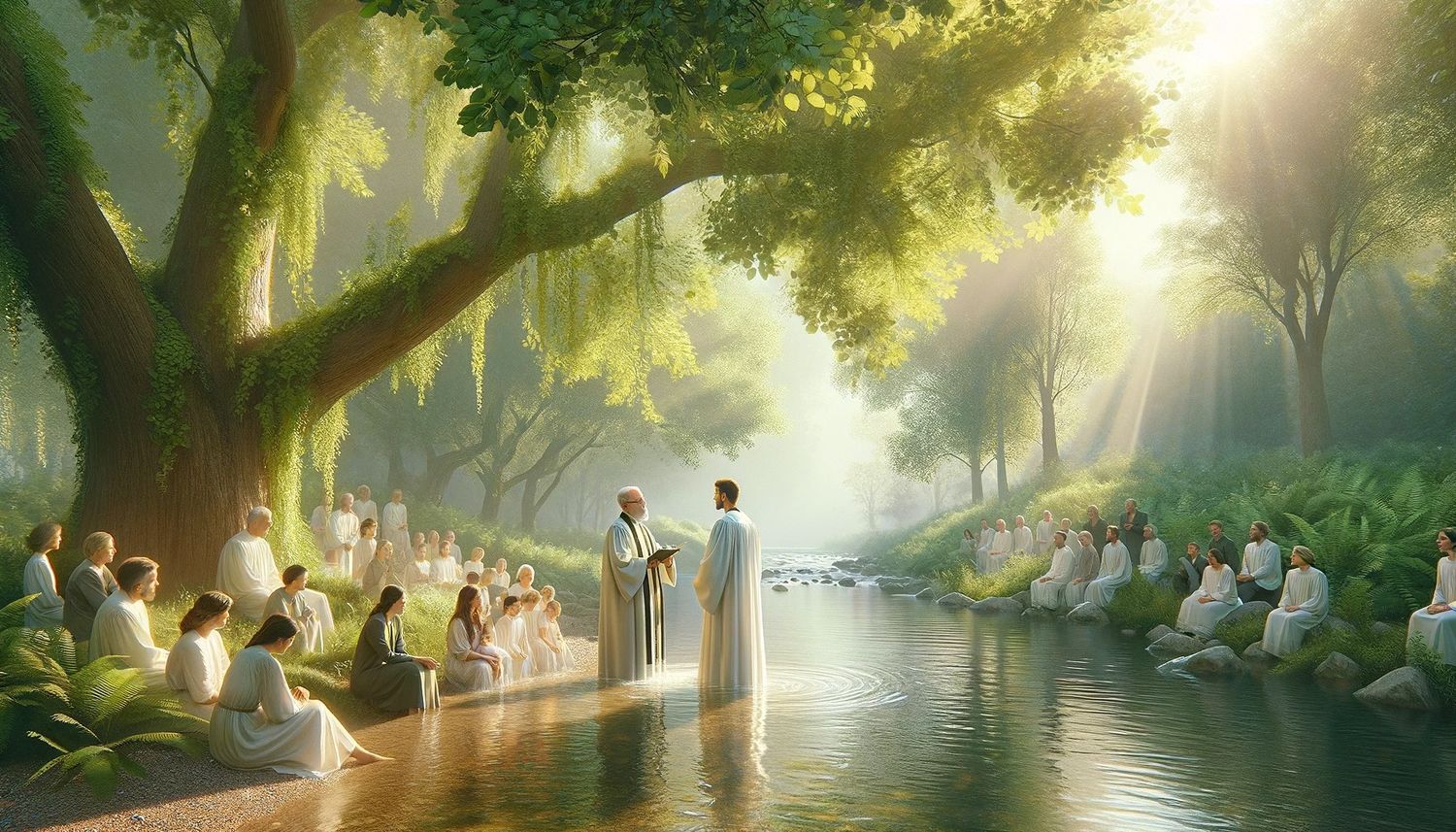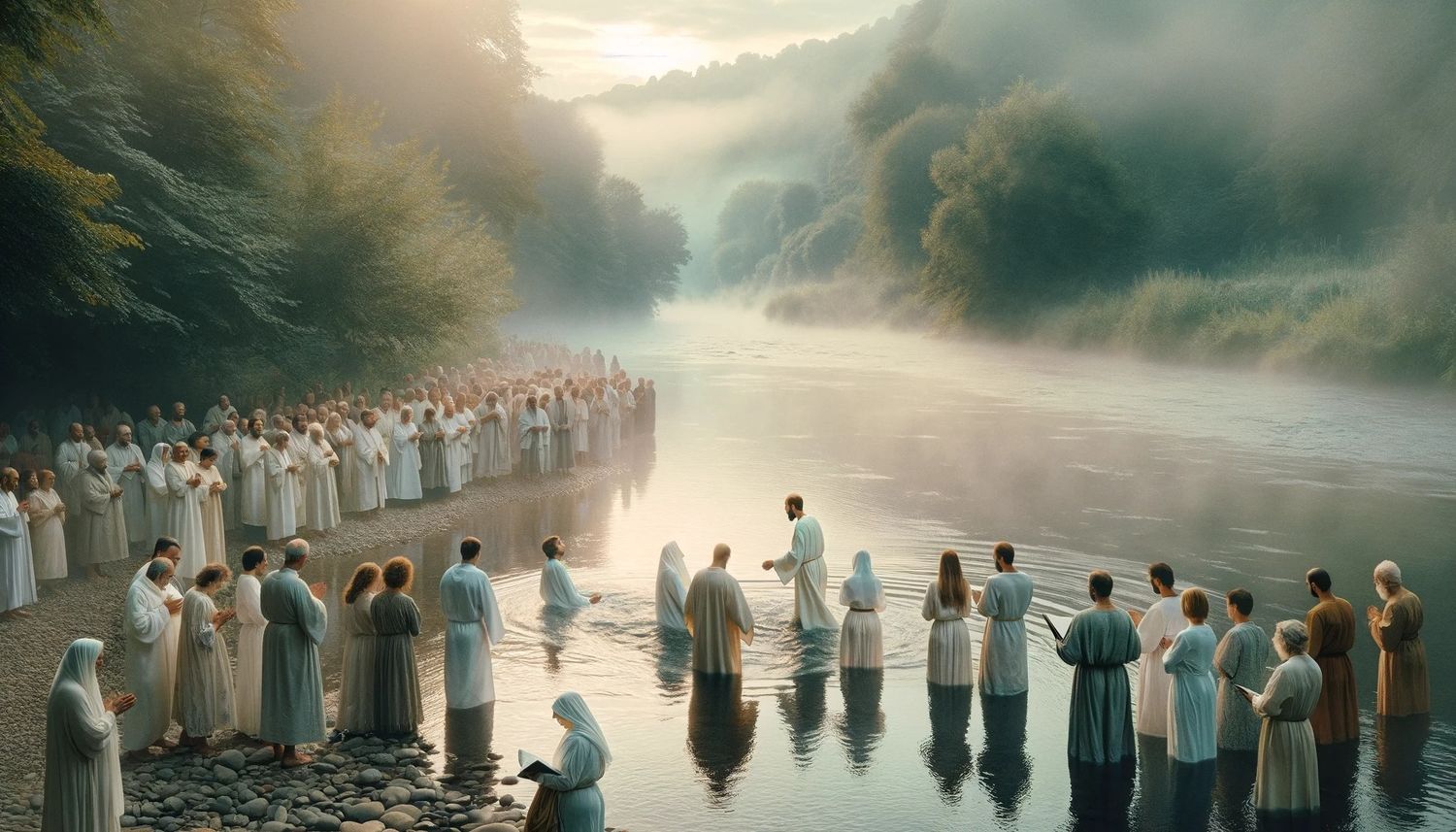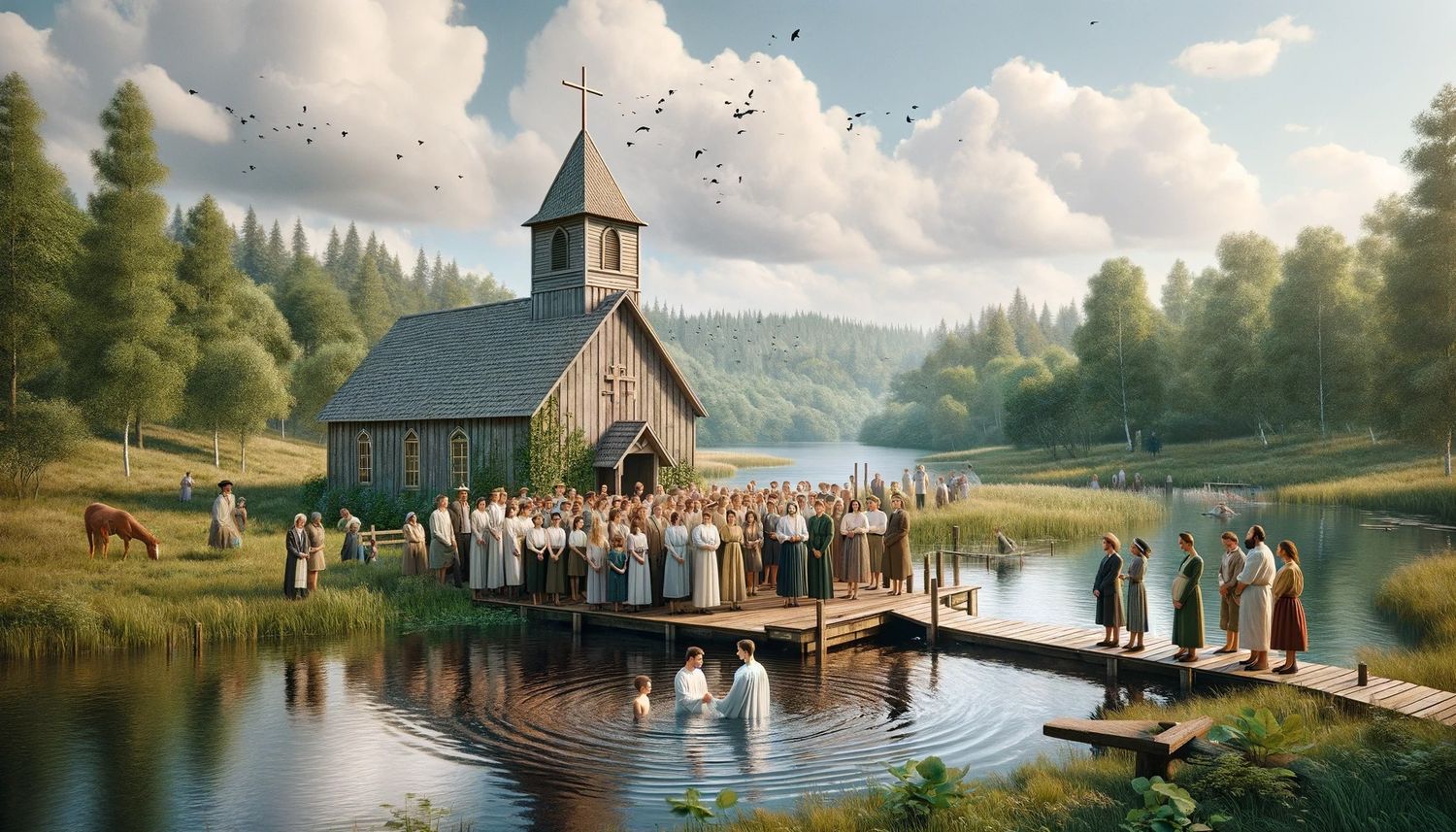Home>Theology and Spirituality>What Do Quakers Believe About Baptism


Theology and Spirituality
What Do Quakers Believe About Baptism
Published: February 28, 2024
Peter Smith, Editorial Director at Christian.net, combines deep insights into faith, politics, and culture to lead content creation that resonates widely. Awarded for his contributions to religious discourse, he previously headed a major organization for religious communicators, enhancing dialogue on faith's societal impacts.
Discover what Quakers believe about baptism and explore the theological and spiritual significance of this practice in the Quaker tradition. Gain insights into the unique perspectives on baptism within Quaker theology and spirituality.
(Many of the links in this article redirect to a specific reviewed product. Your purchase of these products through affiliate links helps to generate commission for Christian.net, at no extra cost. Learn more)
Table of Contents
Introduction
What do Quakers believe about baptism? Quakers, also known as the Religious Society of Friends, have a unique perspective on baptism that differs from many other Christian traditions. In this article, we will explore the historical background of Quaker beliefs, the Quaker understanding of baptism, the role of baptism in Quaker worship, differences between Quaker baptism and other Christian traditions, and contemporary views on baptism among Quakers. Let's delve into the fascinating world of Quaker beliefs and their perspective on baptism.
Read more: What Do Lutherans Believe About Baptism
Historical Background of Quaker Beliefs
-
The Origins of Quakerism: Quakerism emerged in England during the 17th century, amidst a period of religious and political upheaval. It was founded by George Fox, who sought a direct and personal religious experience, free from the rituals and hierarchy of the established Church of England.
-
Core Tenets of Quaker Beliefs: Quakers emphasize the presence of the "Inner Light," the belief that every individual has a direct connection to the divine. This belief led to a rejection of sacraments and outward rituals, including baptism and communion, in favor of a more personal and experiential form of worship.
-
Persecution and Expansion: The early Quakers faced persecution for their unconventional beliefs and refusal to conform to the practices of the Church of England. Despite this, Quakerism spread to other parts of the world, including North America, where it played a significant role in the religious landscape.
-
Emphasis on Equality and Social Justice: Quaker beliefs also emphasize the principles of equality, simplicity, and social justice. This has led Quakers to be active in various social and humanitarian causes throughout history, including the abolition of slavery and the promotion of peace.
-
Evolution of Quaker Beliefs: Over time, Quaker beliefs have evolved, leading to a diverse spectrum of practices and theological perspectives within the Religious Society of Friends. Despite this diversity, the core emphasis on the Inner Light and the rejection of outward sacraments remains central to Quaker identity.
The historical background of Quaker beliefs provides important context for understanding their perspective on baptism and how it differs from traditional Christian views.
The Quaker Understanding of Baptism
-
Inner Baptism: Quakers believe in the concept of "inner baptism," which emphasizes the inward spiritual transformation and purification of the individual. This inner baptism is seen as a direct experience of the divine presence and guidance, transcending the need for outward rituals or sacraments.
-
Rejection of Outward Symbols: Quakers traditionally do not practice water baptism or any other outward ritual as a sacrament. Instead, they prioritize the inward spiritual journey and the ongoing process of spiritual growth and renewal.
-
Emphasis on Equality: Quakers believe in the equality of all individuals before the divine, regardless of their gender, race, or social status. This belief in equality extends to their understanding of baptism, as they emphasize the universal access to the divine without the need for intermediaries or specific rituals.
-
Direct Experience of the Divine: The Quaker understanding of baptism aligns with their broader emphasis on the direct and unmediated experience of the divine. They believe that every individual has the capacity to commune with the divine without the need for external ceremonies or religious authorities.
-
Spiritual Cleansing and Renewal: For Quakers, baptism is not a one-time event but an ongoing process of spiritual cleansing and renewal. This continuous process of inner transformation is guided by the Inner Light and the individual's personal relationship with the divine.
-
Living Out the Baptismal Spirit: Quakers emphasize the importance of living out the principles and values associated with baptism, such as love, compassion, and justice, in their daily lives. This active embodiment of the baptismal spirit is seen as a central aspect of Quaker faith and practice.
The Quaker understanding of baptism reflects their broader theological emphasis on the direct experience of the divine, the rejection of outward rituals, and the universal access to spiritual transformation. This unique perspective sets Quaker beliefs apart from many traditional Christian views on baptism.
The Role of Baptism in Quaker Worship
-
Absence of Formal Baptismal Rites: In Quaker worship, the absence of formal baptismal rites is a defining feature. Unlike many Christian traditions that incorporate baptism into their worship services, Quaker meetings typically do not include baptism as a formal sacrament or ritual. This absence reflects the Quaker emphasis on the inward spiritual journey and the equality of all individuals before the divine.
-
Silent Worship and Spiritual Communion: Quaker worship, often characterized by silent meetings, provides a space for spiritual communion and reflection. During these gatherings, individuals seek to connect with the Inner Light and experience the presence of the divine within themselves and among the community. This emphasis on direct spiritual communion aligns with the Quaker belief in the sufficiency of inward transformation without the need for outward sacraments.
-
Baptism of the Spirit: Quaker worship places a strong emphasis on the concept of the "baptism of the Spirit," which refers to the inward experience of spiritual purification and empowerment. This spiritual baptism is seen as a continuous process that occurs within the individual and is not dependent on external rituals or formal ceremonies. Quaker worship provides a space for individuals to seek and deepen their experience of the baptism of the Spirit through silent contemplation and communal sharing.
-
Community Support and Witness: While Quaker worship may not include formal baptismal rites, it serves as a supportive and communal space for individuals to bear witness to their spiritual journeys. During meetings for worship, individuals may share personal experiences, insights, and spiritual leadings, contributing to the collective spiritual growth of the community. This communal support and witness reflect the Quaker belief in the importance of shared spiritual experiences and the nurturing of individual and collective faith.
-
Living Out Baptismal Principles: Quaker worship encourages individuals to embody the principles associated with baptism in their daily lives. The values of love, peace, integrity, and equality, often associated with baptism in other Christian traditions, are central to Quaker faith and practice. Therefore, Quaker worship serves as a space for individuals to seek guidance and strength in living out these baptismal principles in their interactions with others and in their engagement with social and ethical issues.
-
Continual Spiritual Renewal: Quaker worship, with its focus on continual spiritual renewal and the ongoing experience of the divine, reflects the Quaker understanding of baptism as an ongoing process rather than a one-time event. The worship experience provides opportunities for individuals to seek spiritual refreshment, discernment, and guidance, aligning with the Quaker belief in the ever-present possibility of inner transformation and renewal.
In Quaker worship, the role of baptism is intricately woven into the fabric of silent communion, communal support, and the living out of spiritual principles. While formal baptismal rites may be absent, the Quaker worship experience embodies the essence of spiritual baptism and the ongoing journey of inner transformation.
Differences Between Quaker Baptism and Other Christian Traditions
-
Emphasis on Inward Experience: Unlike many Christian traditions that emphasize the outward ritual of water baptism as a sacrament, Quakers prioritize the inward experience of spiritual transformation. While other Christian denominations view baptism as a public declaration of faith and a means of receiving divine grace, Quakers focus on the individual's direct communion with the divine without the need for external ceremonies.
-
Rejection of Outward Symbols: Traditional Christian traditions often use water baptism as a symbolic act of purification and initiation into the faith. In contrast, Quakers reject the use of outward symbols and rituals, emphasizing the sufficiency of the Inner Light and the direct experience of the divine. This rejection reflects the Quaker belief in the spiritual equality of all individuals and the accessibility of divine guidance without the need for intermediaries or specific rites.
-
Universal Access to the Divine: While many Christian traditions view baptism as a necessary sacrament for salvation or membership in the faith community, Quakers believe in the universal access to the divine without the requirement of specific rituals. This inclusive perspective aligns with the Quaker emphasis on the Inner Light present in every individual, transcending the need for formalized sacraments or prescribed religious practices.
-
Continuous Spiritual Renewal: In contrast to the one-time nature of water baptism in many Christian traditions, Quakers view spiritual transformation and renewal as an ongoing process. The concept of inner baptism and the continual experience of the divine align with the Quaker belief in the ever-present possibility of spiritual growth and the need for ongoing personal and communal renewal.
-
Community Witness and Support: While baptism in traditional Christian traditions often involves a public declaration of faith within a specific religious community, Quaker beliefs emphasize the communal support and witness to individual spiritual journeys without the need for formalized baptismal rites. Quaker worship provides a space for individuals to share their spiritual experiences and seek collective support, reflecting the Quaker belief in the importance of shared spiritual growth within the community.
-
Living Out Baptismal Principles: In many Christian traditions, baptism is associated with the adoption of specific ethical and moral principles. Quakers, while not practicing formal baptism, emphasize the embodiment of values such as love, peace, integrity, and equality in their daily lives. The living out of these baptismal principles is central to Quaker faith and practice, shaping their interactions with others and their engagement with social and ethical issues.
The differences between Quaker baptism and other Christian traditions highlight the unique emphasis on the inward experience of the divine, the rejection of outward symbols, the universal accessibility of spiritual transformation, and the ongoing nature of personal and communal renewal within the Quaker faith.
Read more: What Do Methodist Believe About Baptism
Contemporary Views on Baptism Among Quakers
In contemporary Quaker communities, views on baptism continue to reflect the diversity of theological perspectives and practices within the Religious Society of Friends. While the core emphasis on the inner experience of the divine and the rejection of outward rituals remains central, there are nuanced variations in how individual Quakers approach the concept of baptism.
-
Liberal Quaker Perspectives: Within liberal Quaker meetings, there is a tendency to interpret baptism as a metaphor for the ongoing spiritual journey rather than a formal sacrament. Many liberal Quakers emphasize the universal accessibility of spiritual transformation and the importance of personal reflection and growth. This perspective aligns with the broader liberal Quaker emphasis on inclusivity, social justice, and the evolving nature of religious experience.
-
Conservative Quaker Practices: In conservative Quaker communities, there may be a greater adherence to traditional Quaker beliefs, including the rejection of outward sacraments such as baptism. However, conservative Quakers also value the continuity of historical Quaker practices and may emphasize the spiritual significance of baptism as an inward process of purification and renewal. This perspective reflects the conservative Quaker commitment to preserving the foundational principles of Quakerism while allowing for individual spiritual discernment.
-
Convergent Quaker Approaches: Some contemporary Quakers, often referred to as "convergent Friends," seek to bridge the theological and practical gaps between different branches of Quakerism and engage with diverse Christian traditions. In this context, there may be a reevaluation of the role of baptism within a broader Christian framework, leading to a more nuanced understanding of baptism that integrates Quaker principles with elements of traditional Christian symbolism and practice.
-
Personal Spiritual Journeys: Across all branches of Quakerism, there is an emphasis on the personal and communal nature of spiritual journeys. Contemporary Quakers often approach baptism as a deeply personal experience, shaped by individual spiritual insights, discernment, and ongoing revelation. This emphasis on personal spiritual journeys underscores the Quaker belief in the direct and unmediated experience of the divine, allowing for a wide range of interpretations and practices related to baptism.
-
Exploration and Dialogue: Contemporary Quaker communities also engage in ongoing exploration and dialogue regarding the meaning and relevance of baptism in the modern context. This exploration may involve theological discussions, collaborative worship experiences, and the integration of diverse perspectives within the broader Quaker framework. Such dialogue reflects the dynamic and evolving nature of Quaker beliefs, allowing for a rich tapestry of views on baptism to emerge within the global Quaker community.
In contemporary Quakerism, the views on baptism reflect a dynamic interplay of tradition, personal revelation, theological diversity, and the ongoing evolution of Quaker beliefs. While the rejection of outward sacraments and the emphasis on the inner experience of the divine remain foundational, contemporary Quaker perspectives on baptism demonstrate the adaptability and inclusivity of Quaker faith in response to the changing spiritual landscape.
Conclusion
In conclusion, the Quaker perspective on baptism offers a unique and thought-provoking alternative to traditional Christian views. Rooted in the historical context of Quakerism and the emphasis on the Inner Light, Quaker beliefs challenge the necessity of outward rituals such as water baptism, focusing instead on the direct and unmediated experience of the divine. Quaker worship serves as a space for silent communion, communal support, and the embodiment of spiritual principles, reflecting the essence of spiritual baptism and the ongoing journey of inner transformation. The differences between Quaker baptism and other Christian traditions highlight the universal accessibility of spiritual transformation, the rejection of outward symbols, and the continuous nature of personal and communal renewal within the Quaker faith. Contemporary Quaker perspectives on baptism demonstrate the adaptability and inclusivity of Quaker faith in response to the changing spiritual landscape, showcasing a dynamic interplay of tradition, personal revelation, and theological diversity. Overall, the Quaker understanding of baptism invites individuals to explore the depths of their inner spiritual journey and engage with the divine in a deeply personal and transformative manner.
